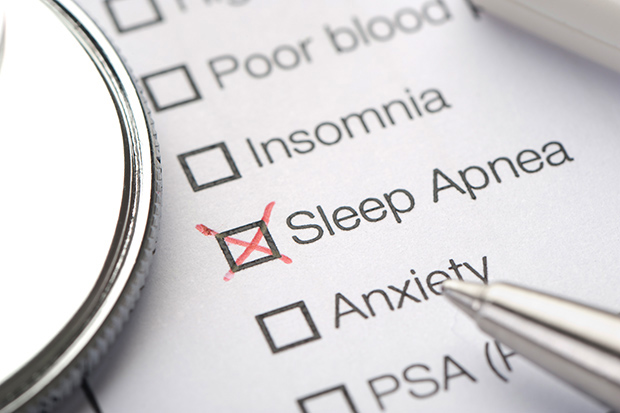
By Jeffrey Bassman, DDS, PC, Center for Headaches, Sleep & TMJ Disorders
Sleep apnea and stroke are prevalent disorders worldwide, and the conditions are, unfortunately, on a steady rise. There is quite a bit of research indicating that untreated sleep apnea can often lead to strokes, and a stroke can actually produce sleep apnea as one of its many complications.
In order to understand the association between sleep apnea and stroke, one needs to have a clear idea of a definition of both conditions. Sleep apnea (often referred to as obstructive sleep apnea or OSA) is a disorder where the flow of air to the brain pauses or decreases during sleep. There are several variations of sleep apnea (snoring/mild/moderate/severe) that differ according to the severity and degree of these airflow interruptions. A stroke is the sudden death of brain cells in a localized area due to inadequate blood flow. A stroke occurs when the blood supply to part of your brain is interrupted or severely reduced, depriving brain tissue of oxygen and nutrients.
These definitions are brief, and a complete description of OSA and stroke are much more involved than what is presented here in this article. Suffice it to say that both conditions can result in many complications and medical concerns, including death, and should not be taken lightly. The numbers of those who suffer from OSA in the general population can be quite extensive, with as many as 18 million adults in the USA according to the National Sleep Foundation. This number does not include children. The American Heart Association/American Stroke Association has reported that stroke is the number five cause of death in the United States, killing nearly 129,000 people a year. Stroke kills someone in the U.S. about once every four minutes.
So, what is the connection between stroke and OSA? There have been numerous studies that indicate that sleep apnea often increases the likelihood of having a stroke! Dr. Sachine Rastogi, a radiologist at Mount Sinai Medical Center in Miami Beach, has alluded to the connections: “Sleep Apnea is one step removed from the heart attack or stroke—it’s what the sleep apnea does to the circulatory system and heart that causes the stroke.”
The most common sleep disorder is obstructive sleep apnea. This is a serious condition. Sleep apnea increases the risk of having a second stroke. Loud snoring, choking, and gasping sounds during sleep may mean that you have sleep apnea. The relationship between OSA and stroke is a complex one with shared risk factors. Several studies have established hypertension resulting from OSA as one of the leading causes of a stroke. OSA has also been linked to other causes of strokes, including insulin resistance, coronary artery disease, heart failure, and arrhythmia. A recent Mayo study found that cardioembolic stroke is far more common in patients with OSA than in patients without OSA.
So, is OSA preventable? Is a stroke preventable? Not necessarily, but prevention is critical. If OSA is diagnosed, and a CPAP machine is recommended, one should consider using the machine to avoid the many complications from not using it. In my practice, I receive many referrals from sleep specialists and neurologists for patients who cannot tolerate the CPAP. We make mouthpieces that are designed to keep the lower jaw forward to open up the airway and help with the OSA. The CPAP and its variations are the gold standard for treatment, but if you cannot use the machine, a mouthpiece is certainly a viable alternative and much more tolerable. The risks to your health and life should be seriously considered.
Jeffrey Bassman, DDS, PC, has been practicing dentistry in the Quad Cities since 1977 and TMJ and dental sleep medicine since 1985. For more information or a free consultation, please call 563-391-1525, or visit www.jbassmantmj.com.
Photo credit: Courtney Keating/iStock
Photo credit: viola83181/iStock

